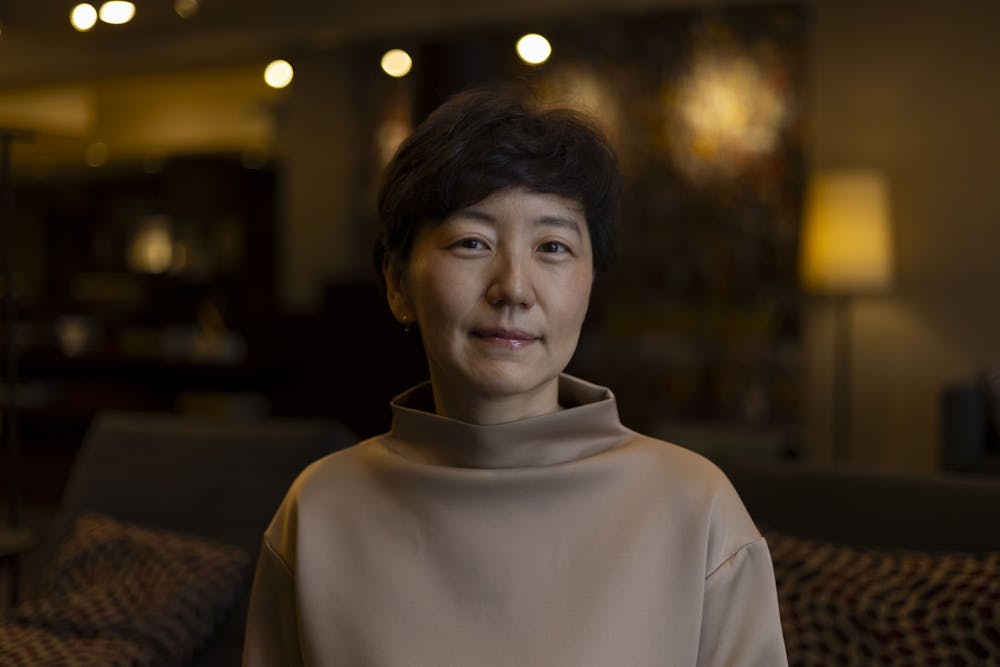'Everyone deserves to return home'
Defense POW/MIA Accounting Agency's Jennie Jin visits CMU
Central Michigan University students in three courses in the Philosophy, Anthropology and Religion department had the opportunity to hear from Jennie Jin, a forensic anthropologist from the Defense POW/MIA Accounting Agency (DPAA). One of her accomplishments negotiators in the 2018 talks with North Korea to arrange the repatriation of 55 cases of fallen soldiers’ remains.
The three courses to which Jin spoke during the week of Oct. 9 were forensic sciences, international law and death and dying. One student in the forensic sciences class, Rachel Linton, told Central Michigan Life that Jin’s job involves a lot of the topics her class had been studying.
“(Our course) focus(es) on forensics in class and discusses DNA testing in relation to crime," Linton said. "Doctor Jin uses DNA testing in her work to identify the bodies of POW/MIA, so she talked us through that process and what different forensic techniques can be used in identification."
As of May 22, 2023, over 81,000 Americans remain designated missing since the second world war, which is:
- more than three times the population of Mt. Pleasant, Michigan (21,243 as of 2021)
- more than the amount of people in attendance at the Super Bowl in 2023 (~68,000)
- more than the average attendance of a Taylor Swift concert during the Eras tour (~72,000)
- 1.6 times as many people as the current enrollment at Michigan State University
Worth of American soldiers whose family is missing a father, brother, sister, mother, aunt, cousin and more and who have not been provided a definitive answer on the fate of their loved one.

Jin described the process of identifying soldiers based on their remains. The process begins with anthropologists such as herself identifying if the remains in question are of only a singular soldier, or multiple.
"Just because the remains come from one grave doesn’t make it one person … sometimes we find evidence of ‘co-mingling," she said.
Then, the remains are profiled based on both physical attributes, such as DNA analyses, dental records, height estimates and radiograph scans, which many soldiers were required to have due to tuberculosis concerns at the time, as well as historical records, such as newspaper reports or information provided by family members.
Once an identity is determined beyond doubt, a name is assigned, and the family members of the fallen, if there are any, are notified.
This entire process can be as quick as a few weeks, Jin said, or as long as years, or up to decades.
One such case of the latter was of a Korean War soldier from Lansing, Michigan, named Harry Harkness, which according to Jin, took over two decades from the time his remains were received in 1993 to their successful identification in 2018. However, no matter how long it took, Jin stressed that she and her colleagues would not give up.
“We do this for the person who died -- sometimes they don’t have family members,” Jin said. Regardless, because the U.S ultimately is responsible for their deployment, thus, she argues, we must bring them home. “Because we sent them there -- it was the government who sent them there, so it’s the government’s responsibility to bring them back," she said.
Everyone deserves to return home and be properly honored.”
Though her job seems morbid to some, due to its focus on heavy topics and the concept of mortality and what happens to people when they’ve died, her talk told Linton that Jin still finds purpose in it.
“The biggest takeaway for me was that she loved her job, even though it was dark… it’s clear all this work (is) well worth it for Dr. Jin," said Linton.
Even beyond the "dark" parts of her job, Jin has had her fair share of nerve-wracking excitement as well, such as her dealings with North Korea, which she said was unexpected, after Former President Donald Trump and North Korean President Kim Jong Un’s agreement in 2018 which led to the repatriation of the remains of American soldiers.
“I did not see it coming. When you negotiate, there’s always those big things (leaders agree to) and then other little things, so I thought maybe it would happen (as a smaller thing,) but no, it was right up there with denuclearization… So I was (in Korea) within a week because I headed the Korean War Identification Project.”
The process, once in North Korea, involved a lot of waiting, Jin said. She described one moment in which she was waiting in a designated location for the negotiations, but the North Korean representatives “never showed up.” After some time, she said, one of the landlines in the room started ringing.
“The North Koreans called us - they never came (to the agreed-upon location) but the phone rang, and it was them telling us where to be - on the North Korean side of the Demilitarized Zone (DMZ,)" she said.
Though Jin admits she was nervous, at the time her parents were more nervous than she was; her family had all come from North Korea, having left at the time of the Korean war.
“They were like, ‘do you really have to go? What if you can’t come back?," Jin said.
She described her situation, however, wherein she had arrived with several military generals, as “the safest way to go to North Korea.”
These sorts of personal details interspersed with stories about her work, Linton said, made her presentation exciting.
“I loved Dr. Jin’s talk… I felt like I was stuck on every word she said. She told us some specific stories of her work and it felt very personal… (Her story about) North Korea was very exciting to hear because of how secretive of a country it is. Overall it was one of my favorite academic experiences I’ve ever had!”




